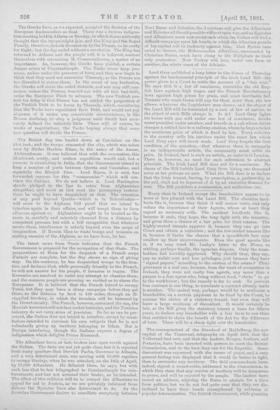Every class in Ireland except the leaseholders appear to be
more or less pleased with the Land Bill. The absentee land- lords like it, because they think it will secure rents, and only reduce the importance of their Agents,. whom at heart they regard as necessary evils. The resident landlords like it, because it ends, they hope, the long fight with the tenantry, and gives them a chance of a fair price for their estates. The highly-rented tenants approve it, because they can go into Court and obtain a reduction ; and the low-rented, tenants like it, because it limits the chance that a spendthrift heir may swallow up their improvements. Even the good agents like it, if we may trust Mr. Leahy's' letter to the Times, as settling, perhaps finally, the agrarian dispute. Only the lease- holders feel horribly aggrieved. Why should they, they say,. pay an unfair rent and. lose privileges, just because they have "signed papers," according to the custom of the estate ? Their grievance is a real one, because, from the want of occupation in Ireland, they were not really free agents, any more than a pauper is a free agent who, being without food, " elects" to go to the workhouse ; but the remedy is far to seek. To prevent free contract is one thing, to terminate a contract already made is another. The easiest way, perhaps, would. be to authorise a leaseholder, on a certain payment to be fixed by the Court, to. assume the status of a statutory tenant, but even that will leave a large residuum of discontent. It would certainly be fair, as the Bill gives the statutory tenant a lease for fifteen years, to declare any leaseholder with a less term to run than that entitled to claim the benefit of the Act for the difference of term. There will be a sharp fight over the leaseholder.


































 Previous page
Previous page